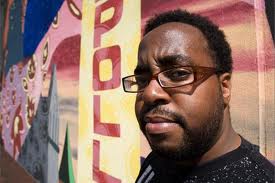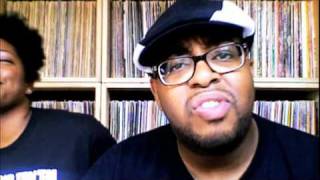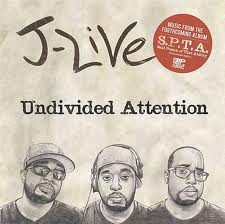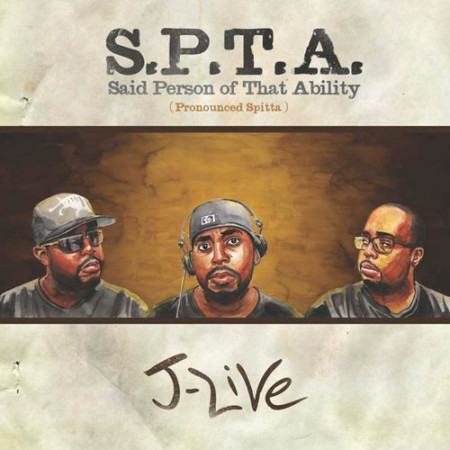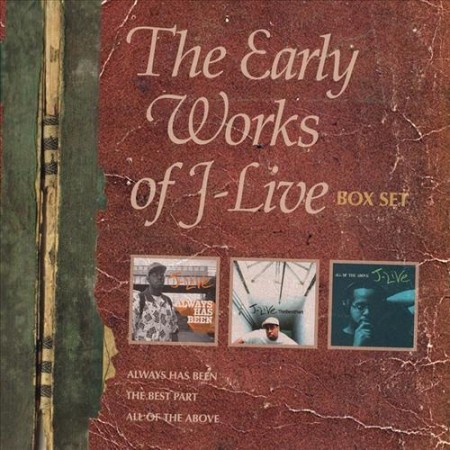J-Live
As an emcee, dee-jay, producer and CEO of his aptly named company Triple Threat Productions, J-Live’s music has been a staple of inspiration for listeners of hip hop from New York to Cali and around the world. His discography spans over 10 years and includes four full-length albums, two EPs, a collection of earlier singles, as well as countless guest appearances and features. His last two projects “Reveal the Secret EP” and the full length “Then What Happened” were released by BBE in May 2008.
While J-Live is all but a household name to those who collect their knowledge of hip hop music via mainstream radio, he has worked with his share of icons in the industry. Producers such as DJ Premiere, Pete Rock, DJ Spinna, Prince Paul, DJ Jazzy Jeff, DJ Spooky, Numark, Da Beatminerz, Dan the Automater to name a few. Recording artists the likes of Mos Def, El Da Sensei, Wordsworth, Talib Kweli, Chali Tuna and several others have all shared song credits with JLive. World renown for a stage show that lives up to his name, J has toured around the country as well as Canada, the UK, Europe, Japan, the Middle East, Africa and Australia. J-Live shared stages with artists such as The Roots, Wyclef Jean, Fabolous, Soulive, Ozomatli, Soundtribe Sector 9, Blackalicious, Sister Nancy, Wu Tang Clan, A Tribe Called Quest, De La Soul, MF Doom, KRS One, and many others.
Born Jean-Jacques Cadet (Jon Joc Ka-Day) and raised by his Mother in Spanish Harlem on the east side of Manhattan off First Ave, J-Live reps NY in more ways than one. While working towards his bachelors degree in English from State University of New York at Albany, J-live was already touring the world and learning the ropes of the industry. Introduced to the 5% Nation (or Nation of Gods & Earths) during his college years, Jean-Jacques would eventually change his name to Justice Allah.
Before graduating, with the help of Raw Shack Productions, he signed a deal with Payday / London / PolyGram. Shortly after graduating, J learned that the best laid plans o’ mice and rappers oft go awry. Especially when corporate take-overs dissolve labels and separate artists from distributors. In 1999, the highly anticipated, often illegally duplicated debut album “The Best Part” would go down in history as one of the best records never heard. That is at least until the many bootleg versions were followed by the official release in 2001. By then, J was living in Brooklyn, teaching 7th Grade Language Arts in some of New York’s toughest school districts. J would find himself at a crossroads in 2002. With the opportunity to release what would be his “second first album” All of the Above”. J decided to suspend his teaching career and pursue music full time. All of the Above was released on independent label Coup D E’tat / Caroline’s. After severing ties with CDE, J put out his first totally self produced project in 2003, Always Will Be. The 8 song EP released on Fat Beats Records showed fans that Triple Threat was more than just a corporate identity as J took on the task of all verses, beats and scratches himself. In 2005, with Penalty Ryko’s release of The Hear After, it became clear that as labels come and go, J-Live would continue to find a way to release quality music to his ever growing fan base. People have come to expect a certain standard of quality with every J-Live record. Whether self produced or working with others, J’s beats are typically bass heavy consistent boom-bap instrumentals that incorporate and infuse various genres of music from afro beat, latin, jazz, reggae, rock, and funk into his own distinct timeless hip hop sound.
For better or worse, J-Live has developed a reputation for going against the grain of an industry dominated by flavor of the month pigeon holed made up characters. J’s subject matter is as eclectic as his taste in music. His most popular tracks show that he is more than just a boastful wordsmith that can rock a party. Often times an introspective philosopher of life, love, music, and people, J delivers hard hitting well thought out social commentary on issues ranging from US Foreign policy to the environment, black on black crime to police brutality. However, he is very deliberate in maintaining balance on each of his albums. Humorous, sometimes hilarious narratives like One for the Griot or Car Trouble are filled with vivid imagery. There are the traditionally devastating battle verses on songs like Whoever and Always Will Be. Party and show anthems like Adda Cipher, Harder, and Don’t Play. As his reputation and following continue to grow with his catalogue, the one common and constant theme in J-Live’s ever evolving style of music, is the use of original styles, and imaginative concepts, to stay fresh relevant and timeless.
Asheru
It took several years after their formation in 1996 before the Unspoken Heard began to make waves in the East Coast hip-hop underground, but the rapper/producer collective, based in the nation’s capital, certainly did just that as the new millennium turned, and Asheru and Blue Black had a lot to do with the success.
Asheru (born Gabriel Benn), a Maryland native, and Blue Black (born Robert Jackson), who originally hailed from the Bronx, met and became friends while each was a student at the University of Virginia (majoring and eventually taking degrees in anthropology and sociology, respectively). Both men were long interested in rapping; they soon formed a duo and fell in with a group of similarly inclined students: the nucleus of what would ultimately become the “Home of the New Age B-Boy,” Charlottesville indie label 7 Heads Entertainment (J-Live, Mr. Complex, Richy Pitch, Djinji Brown). Alternately setting up shop in Washington, D.C., and New York City after graduation, Benn took a full-time job as a middle school teacher and Jackson became involved in e-commerce, all the while working on music in their spare time. Blue Black was the first to represent the Heard in 1996 with the solo 12″ Sun Up from Sun Down. He was joined by Asheru on the classic 1999 single Better/Smiley, which was bookended by a pair of Unspoken Heard EPs, Cosmology and Jamboree, all released on Seven Heads. Asheru and Blue Black both gave up their day jobs in 1999 to dedicate more time to recording and touring. (Benn additionally became an educational consultant, developing original curricula and conducting workshops; Jackson became a business consultant.) The result of their increased efforts in the studio was a literate, conscientious 2001 debut effort, Soon Come… Heavily indebted to the New York “new school” sound of the early ’90s, especially the Native Tongues vibe, the album developed a steady buzz, landing it on a number of year-end best-of lists. 48 Months followed in 2003. ~ Stanton Swihart, Rovi

